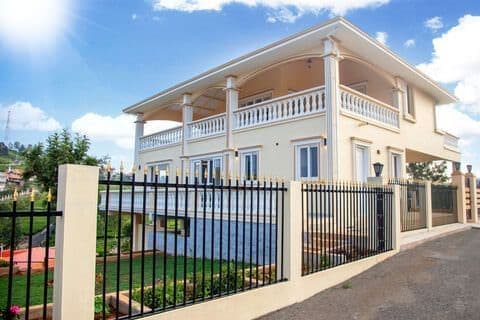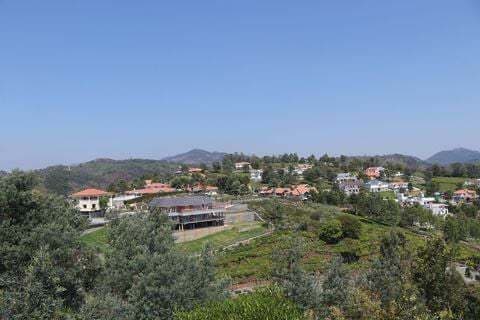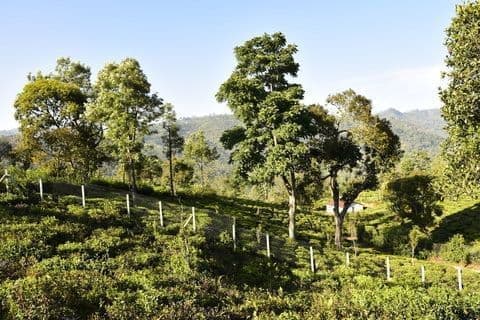This guide is to help you, as a potential buyer in the Nilgiris, get a fair hang of the following:
- Rules and Charges that are relevant when you buy a property
- General Rules of Building a Residence in the Nilgiris
- Locations of Interest as a future resident
- What Vitrag can Offer to ease the process
Coonoor - A destination for your future

For Holiday or Leisure?
An attraction for many to invest in the Nilgiris is to enjoy the healthful environment of the tea estates and the mist-filled valley views between hills. With low population density and essential resources in various localities, these villages and towns offer you a sense of comfortable living.

Or maybe Retirement?
With moderate temperatures and mild slopes, many parts of the Nilgiris are attractive locations to live in for the better days of your life. Some properties closer to Coonoor, Kotagiri or Ooty town, with good connectivity, are more convenient options.
What Vitrag has to offer
Charges and General Building Queries?
Vitrag's New vs Established Communities
There are salient differences between the gated society spaces we have to offer.
Established gated communities
From 2002 to 2014, we successfully delivered three prominent gated community projects, covering over 70 acres along the Coonoor-Kotagiri Road. These spaces featured basic facilities that aid good living in the hills.
Newer developments
Currently, we are working on niche gated communities with smaller parcels of land between 3-7 acres. Our properties pivot around Coonoor and Wellington for the convenience of being close to the recreation centres like the Coonoor Club and the Wellington Gymkhana Club.
Who can buy in the Nilgiris?
Anyone Indian or of Indian origin overseas (NRI or OIC) can purchase a property in the Nilgiris. Buying a property is not restricted to just plots of a specific size or a land category. All these properties are freehold properties. One may buy a residential, commercial panchayat, municipal or even something significant as a tea estate. Tamilnadu does not restrict the purchase of property just to the people of TN.
What are the charges to purchase a property?
Below are the charges that one may need to pay on a one-time or recurring basis
- Registration and stamp duty in Tamil Nadu work out to 9_%_ (7% + 2%).
- Legal, name transfers and miscellaneous charges for a building are about 1.5 lakhs.
- One-time Association corpus contribution as a member of a gated community - It is usually Rs. 50,000 to 2 lakh based on which assembly it may be.
- Association AMC charges for a Financial year - The charges are typically between 25,000 to 40,000 based on a resolution passed in the association's AGM.
- Water charges - Our gated communities account for water consumed from the gated community's standard water supply at five paise per litre. The fee is a nominal charge covering water resources maintenance, workforce and the distribution system's maintenance.
- Other taxes that apply for vacant land/buildings etc., to the govt.
- Cleaning, gardening, caretakers, servants etc., fall upon you to handle. There are service agencies that take up annual maintenance and ad-hoc maintenance.
What are the charges beyond just the transaction?
Beyond a quoted price, there are various charges that the buyer incurs while purchasing a property in Tamilnadu. The registration is pegged at 7% of the total value, while the stamp duty is at 2% of the total value. That adds up to 9_% of the transaction value_. The other charges one may incur are lawyer's fees and various transfer fees that aid in changing_ revenues and land records_ in the local bodies. For buildings, there could be additional miscellaneous charges and taxes.
Can I take a home loan while buying a property?
One can apply for a home loan and purchase the property for a built house.
For land, all lands in the Nilgiris are purchased with self-funding. A home loan may be procured when you have a plan approval before constructing a house.
NRIs are also eligible to take up a housing loan. We recommend taking a housing loan to the client who intends to build within three years of purchasing a property.
What are the classifications of land in the Nilgiris?
All survey numbers have some classification in municipal zones such as Coonoor or Kotagiri. Currently, the Nilgiris follow the classifications made in the gazette of 1993. If you intend to buy land for residential purposes, consider checking if it falls in the residential (PR) or multi-use zones (MUZ). Wooded zones have further restrictions when you wish to construct.
The panchayats in the Nilgiris are unplanned zones. Land classification is usually unclassified in a tea estate as tea is a plantation crop. Agriculture zones are demarcated only for specific spaces restricted to agriculture besides tea.
What are the general residential building guidelines in the Nilgiris?
Below is a general summary based on the reading from General Building Guidelines as per the Hills Station Building Rules 1993. Please refer to the leading guide.
- Must maintain a Setback of 3 feet from the boundary on either side.
- A Setback of 5 feet from the entrance is to be maintained.
- Everyone who constructs, reconstructs or alters or adds to the building shall, wherever the site is within 15 meters of any tank, reservoir, watercourse, river, freshwater channel or well, carryout such measures as may be necessary or as the Government may direct to prevent any contamination of or any risk of the drainage of the building passing into such tank, reservoir, watercourse, river freshwater channel, or well.
- It provided that no existing building situated within 90 metres from any burning or burial place or ground shall be reconstructed or added to without the previous approval of the Government.
- No assignment of land shall be made for agricultural or any other purpose, including residential, within 150 metres from the boundaries of reserve forest and wooded grounds or areas of particular interest as may be declared by the Government from time to time and 15 meters from buffer from a Reserve forest.
- The height of a building shall not exceed seven metres. The height of a building referred to in this sub-rule shall be reckoned from the general ground level of the site and shall be measured at every point of the ground. The top floor shall be with a sloped roof.
- Shall use no site having a gradient steeper that-one vertical to three horizontal for the construction of a building.
- No site shall be approved for construction or reconstruction of a dwelling house unless it has an extent of not less than 95 square metres and minimum width of six metres.
What are the sizes and building plan approvals in the Nilgiris?
The rules of the Tamil Nadu Hill Development act, Forest act and other land zoning and laws apply in the Nilgiris. One must be critical to check all the documentation, zoning, slope and development regulations that may apply to the prospective property. Beyond this, titles, ownership and possession are critical to check, either directly or through an accomplished lawyer.
Essentially there are four levels of approvals available in the Nilgiris based on the Hill Areas Development Act of Tamil Nadu. These could change over time and maybe situation based as well. Please do check again with a capable lawyer.
- Up to 138 sq. m (1500 sq. ft) – NOC required from the Geotech department
- Up to 250 sq.m (2690 sq. ft) – NOC required from Agri, Forest, Geotech, Tea board & processed through the Collectorate.
- 300 sq.m (3228 sq. ft) – approval from AAA sanction (Architectural and aesthetics aspects committee) in addition to NOC from Agri, Forest, Geotech, DTCP, Tahsildar, Sub-Collector & Fire department
- Above 300 sq.m (3228 sq. ft) – approval from HACA and NOC from Agri, Forest, Geotech, DTCP, Tahsildar, Sub-Collector & Fire department.
Can I obtain a plan approval?
For all properties that Vitrag Group deals with, thorough checks ensure future residents are not restricted to building houses. We help obtain a plan approval in the guidelines of the current laws governing the Nilgiris. Like any other part of the world, we are not immune to changes in laws and thus have to work with the current rules of the land.
How do I maintain my home while I am away?
Entrepreneurs here in Coonoor have come up with garden maintenance, house cleaning, and handyman services. They also take up annual maintenance contracts (AMC) to keep your house in good condition during your absence.
Some homes also employ full-time caretakers who take up day jobs or live in the quarters provided by the owners.



